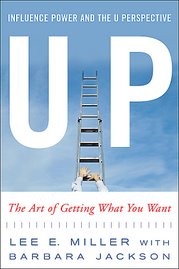
Influencing through others can produce impressive results. If presented properly, a message delivered by someone other than yourself carries additional weight. Having someone else exert influence on your behalf is tricky to pull off because it requires understanding, and appealing to, not only the U Perspective· what someone else cares about· of a third person whom you do not have the opportunity to interact with directly but also that of the person who will be delivering the message for you. In addition to having to motivate the person delivering the message you have to make sure that the message they deliver is the one that you actually want to convey. Moreover because you are not there to gauge how people react, you are unable to adjust the message if it does not have the intended effect.
Sometimes you will want someone else to deliver your message because they have greater legitimacy with the person you are seeking to influence. For example, the Executive Director of a major Non-Governmental Organization ("NGO") was trying to make certain changes in the organization. One of the individuals whose support she needed while giving "lip service" to the proposed changes, she was not doing anything to implement them. The Executive Director did not have direct authority over this individual who was employed by a university that worked with the organization and, despite her best efforts, was unable to gain this person's support. So Barbara Jackson, a well respected consultant and executive coach, was brought into help.
Barbara was asked to create a strategy for implementing the proposed changes and to develop standards, against which to measure the progress that was being made. By bringing in an expert that had credibility with the organization to develop standards for those individuals working on the initiative, the Executive Director was able to get the resisting individual to do what was required of her. While this individual could ignore the Executive Director, she could not ignore a respected consultant retained with the approval orthe organization's Board of Directors.
Legitimacy is the aura of authority someone creates when they deliver their message. It adds credibility to the positions being advocated. Because people tend to defer to authority, individuals perceived to have legitimacy are better able to exert influence. Understanding that psychological imperative is critical to increasing one's ability to win people over. While there are a number or ways a person can enhance their legitimacy. It is easier, and often more effective. to use someone who already has a great deal of legitimacy with those you seek to influence. That is why experts are brought in to help persuade.
People with whom someone has had previous positive dealings, people in positions of power, people with recognized expertise, celebrities, as well as individuals perceived to have a certain status, all carry legitimacy. Selecting the right person to deliver your message can insure that it produces the desired results. In addition to using credible individuals to leverage the power or your message, sometimes you need to exert influence through someone else simply because you cannot be everywhere and do everything yourself. When you are busy or seeking to persuade someone that resides a great distance away it is often necessary to influence through someone else. Perhaps you will choose to do so through a person that works for you, a local agent or someone who works in your organization at a nearby location.
When you seek to substitute someone for you that has not been selected because they already have legitimacy, you need to provide a reason for people to want to work with that individual. If that person's position is the same level as yours or at a higher level, that will probably be sufficient. If not, however, you will need to promote your designee as an expert in some aspect of the transaction so as to confer sufficient status to encourage people to want to work with him or her. Otherwise they will wonder why you are not dealing with them directly. It is essential, moreover, that you keep checking in with your representative to ensure that he or she is proceeding in the right direction. Once you have conferred sufficient status on that person it is virtually impossible for them to change their position once they make a commitment without threatening the relationship.
Working through others is an approach to influencing that can be used with great success in a variety of different circumstances for an assortment of reasons. How best to exert influence through others, depends on the reason why you are doing so. Properly utilized, however, influencing through others is one of the tools that every executive should have in their arsenal.


